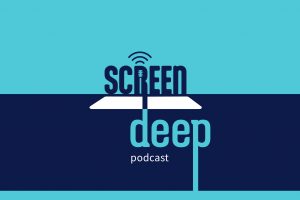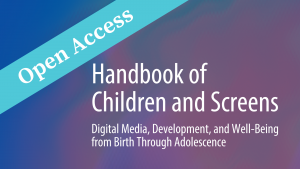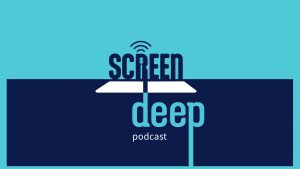Many people think of mental health disorders as arising later in childhood or adolescence. However, there is increasing evidence that even young children can experience mental health problems like anxiety and depression. On this episode of Screen Deep, host Kris Perry is joined by Joan Luby, a Professor of Child Psychiatry at Washington University School of Medicine and an expert in early childhood mental health. Dr. Luby discusses how to identify mental health problems in preschool-aged children and the role of screens in exacerbating these issues. Drawing on her clinical experiences and research, she provides suggestions for parents on how to promote the best socio-emotional outcomes for their young children.
Listen on Platforms
About Joan Luby
Joan Luby, M.D. is the Samuel and Mae S. Ludwig Professor of Psychiatry (Child) at the Washington University School of Medicine where she founded and leads the Early Emotional Development Program. Dr. Luby specializes in infant/preschool psychiatry and her program of research has focused on early childhood affective psychopathology and emotional development for 30 years. Dr. Luby has conducted some of the first large scale empirical studies of preschool onset depression and provided data on the validity, clinical characteristics, longitudinal course and brain developmental outcomes of early onset depression. With colleague Deanna Barch, she conducted a 17 year longitudinal study that investigates behavior and brain development in a sample enriched for depressive symptoms arising at age 3 that includes 5 waves of brain scanning. Findings have informed the impact of key psychosocial factors including maternal support and early life adversity on brain and behavioral development. Luby’s studies have established the powerful role of early childhood caregiver support and psychosocial adversity on neurodevelopment. Dr. Luby has developed and tested a novel early parent child intervention for depression that focuses on enhancing emotion development showing powerful effects and neural change. Dr. Luby has published 300 papers and has been awarded numerous honors including membership in the National Academy of Medicine, the Brain and Behavior Foundation Ruane Award and the American Psychiatric Association Ittelson award.
In this episode, you’ll learn:
-
- How improved diagnostics tools are helping to identify psychiatric and mood disorders in children as young as three years old.
- What unique signs and symptoms to look for in young children that may indicate they are experiencing anxiety, depression, or other concerns.
- Why considering environmental factors is important when evaluating child mental health.
- How high amounts of screen use by young children can impact their mental health and social/emotional regulation.
- The five essential ingredients young children need to thrive.
Studies from this episode, in order of mention:
Herzberg, M. P., Nielsen, A. N., Luby, J., & Sylvester, C. M. (2025). Measuring neuroplasticity in human development: the potential to inform the type and timing of mental health interventions. Neuropsychopharmacology, 50(1), 124-136.
Luby, J. L., Heffelfinger, A. K., Mrakotsky, C., Hessler, M. J., Brown, K. M., & Hildebrand, T. (2002). Preschool major depressive disorder: preliminary validation for developmentally modified DSM-IV criteria. Journal of the American Academy of Child & Adolescent Psychiatry, 41(8), 928-937.
Luby, J. L., Gaffrey, M. S., Tillman, R., April, L. M., & Belden, A. C. (2014). Trajectories of preschool disorders to full DSM depression at school age and early adolescence: continuity of preschool depression. The American journal of psychiatry, 171(7), 768–776. https://doi.org/10.1176/appi.ajp.2014.13091198
Zhang, L., Mersky, J. P., Gruber, A. M. H., & Kim, J. Y. (2023). Intergenerational transmission of parental adverse childhood experiences and children’s outcomes: A scoping review. Trauma, Violence, & Abuse, 24(5), 3251-3264.
Haidt, J. (2024). The anxious generation: How the great rewiring of childhood is causing an epidemic of mental illness. Penguin.
Coyne, S. M., Shawcroft, J., Holmgren, H., Christensen-Duerden, C., Ashby, S., Rogers, A., Rogers, A., Reschke, P.J., Barr, R., Domoff, S., Van Alfen, M., & Porter, C. L. (2024). The growth of problematic media use over early childhood: Associations with long-term social and emotional outcomes. Computers in human behavior, 159, 108350.
Madigan, S., McArthur, B. A., Anhorn, C., Eirich, R., & Christakis, D. A. (2020). Associations between screen use and child language skills: a systematic review and meta-analysis. JAMA pediatrics, 174(7), 665-675.
Souto, P. H. S., Santos, J. N., Leite, H. R., Hadders-Algra, M., Guedes, S. C., Nobre, J. N. P., Santos, L.R., & Morais, R. L. D. S. (2020). Tablet use in young children is associated with advanced fine motor skills. Journal of Motor Behavior, 52(2), 196-203.”
Nielsen, A. N., Triplett, R. L., Bernardez, L. M., Tooley, U. A., Herzberg, M. P., Lean, R. E., Kaplan, S., Meyer, D., Kenley, J.K., Alexopoulos, D., Losielle, D., Latham, A., Smyser, T.A., Agrawal, A., Shimony, J.S., Jackson, J.J., Miller, J.P., Raichle, M.E., Warner, B.B., … & Smyser, C. D. (2024). Prenatal social disadvantage is associated with alterations in functional networks at birth. Proceedings of the National Academy of Sciences, 121(50), e2405448121.
Luby, J.L., Herzberg, M.P., Hoyniak, C., Tillman, R., Lean, R.E., Brady, R., Triplett, R., Alexopoulos, D., Loseille, D., Smyser, T., Rogers, C.E., Warner, B., Smyser, C.D., & Barch, D.M. (2024). Basic environmental supports for positive brain and cognitive development in the first year of life. JAMA pediatrics, 178(5), 465-472.
Lionetti, F., Pastore, M., & Barone, L. (2015). Attachment in institutionalized children: A review and meta-analysis. Child Abuse & Neglect, 42, 135-145.
Pollak, S. D., Nelson, C. A., Schlaak, M. F., Roeber, B. J., Wewerka, S. S., Wiik, K. L., … & Gunnar, M. R. (2010). Neurodevelopmental effects of early deprivation in postinstitutionalized children. Child Development, 81(1), 224-236.
Luby, J., Belden, A., Botteron, K., Marrus, N., Harms, M. P., Babb, C., … & Barch, D. (2013). The effects of poverty on childhood brain development: the mediating effect of caregiving and stressful life events. JAMA Pediatrics, 167(12), 1135-1142.
[Kris Perry]: Hi everyone, and welcome to Screen Deep, where we go on deep dives with experts in the field to decode young brains and behavior in a digital world. I’m your host, Kris Perry, Executive Director of Children and Screens. Today we’re joined by Joan Luby, a pioneer in the field of child psychiatry and a professor at Washington University School of Medicine in St. Louis, where she also founded and directs the Early Emotional Development Program. For more than three decades, Dr. Luby has broken new ground in understanding how mood disorders such as depression can manifest in children as young as three years old.
In today’s conversation, we’ll talk about what early depression might look like, how screen time may be displacing essential early experiences, and, while childhood joy is at the heart of Dr. Luby’s mission, we’ll also explore how parents, caregivers, clinicians, and researchers can better support children in today’s complex world.
Welcome to Screen Deep, Joan.
[Joan Luby]: Thanks for having me.
[Kris Perry]: Many people tend to think of the occurrence of psychiatric disorders primarily in terms of adolescent-age children. Meanwhile, you’ve been a long-time advocate for studying and treating mental health issues in preschool-age children and have literally written the book on early childhood mental health disorders. We’re going to explore connections with screen time and mental health in a minute, but first, let’s lay a foundation for the audience. Can you give our listeners a broad overview of what is known about the prevalence of mental health disorders in very young children?
[Joan Luby]: So over the past couple of decades, as we’ve understood child development—and particularly emotional development in children—more clearly, we’ve been able to identify clinical signs and symptoms of psychopathology much, much earlier in life. So as you said, we’re very familiar with adolescents having mental disorders, and there is somewhat of a surge in many mental disorders during adolescence. But the reason why we think it’s so important to identify the disorders and the precursors and risk factors for these disorders at the earliest possible developmental point is because the brain is more neuroplastic or changeable and therefore, early interventions have proven to be much more effective. So the work that we and many others have done have demonstrated that many psychiatric disorders can be identified as early as age three—things that we would have not previously imagined could be possible in young children and caregivers have frequently not necessarily noticed or detected in the past. And we followed samples of children who we’ve diagnosed as early as age three who are now young adults and we know that they go on to have recurrences, and they go on to have these disorders in adulthood, too, which again just underscores the need to identify and intervene as early as possible.
[Kris Perry]: You know, your answer takes me back to an earlier time in my career when I was a licensed clinical social worker and we were discouraged from thinking of very young children as having a mental health disorder, or even a diagnosis, or a label, for lots of obvious reasons—they can be stigmatizing, or create a negative view by the child, or their parents, or caregivers. So what are some of the other common misconceptions or perceptions about mood and other mental health disorders in young children and has that shifted over the years?
[Joan Luby]: I think that it is shifting. So you’re right, that’s the tension with diagnosis in early childhood—there’s the idea of, if you label a child as having a form of psychopathology, they may be stigmatized. On the other hand, if you ignore it, you may miss a window of opportunity to treat them. So I think it’s more useful to look at psychopathology in the same way that we look at developmental disorders or developmental delays. If you had a child who was having a speech delay, we wouldn’t worry about stigmatizing them. We would try to treat the speech delay because we know it’s very, very important to treat that early and get the child developmentally on track. I think the same thing can be argued for psychopathology, as well. And the more we have effective treatments, and those are increasing in frequency and power, the more important it is to identify these disorders early, so that we can treat them early using developmental and psychotherapeutic interventions.
[Kris Perry]: So what are some of the signs in young children that they might be experiencing a disorder like anxiety or clinical depression? I know from being around young children, their behavior is already somewhat labile. In other words, they’re having lots of emotions in fairly quick order and they’re not always predictable. So how do you look at that array of behavior in a young child and determine whether it’s anxiety or depression or something worse?
[Joan Luby]: That’s true, that’s such a good question. I mean, that is the unique challenge of identifying psychopathology in early childhood because young children have broad expressions of emotions. We know they cry, they have tantrums, you know, way more readily than older children and adults do. And obviously, we don’t want to mislabel that as being a form of psychopathology because we know that’s a normative extreme. So when we try to study and define clinical symptoms, we always compare them to children who have other psychiatric disorders and to children who are healthy, who just display normative extremes. So we know that if a child cries when they’re disappointed, that’s certainly not, you know, a clinical concern, but if they cry when they’re disappointed and the crying lasts for hours, and they’re unable to recover, and they end up feeling bad for the rest of the day, or if they’re crying multiple times a day with the most minor disappointments, that’s when we think there’s reason for concern.
But going on to think about the symptoms of anxiety and depression in early childhood, anxiety can be more easily detected by a parent because anxious behavior can be very inconvenient and impairs family activities. If a child is too inhibited to separate from the parent, to go out into public, to go out and play, if they’re shy and withdrawn, parents tend to notice that and they bring the child in for treatment. Depression is a syndrome that can be very easily missed because depressed children are not disruptive, they tend to keep to themselves, their emotions tend to be what we call “internal,” so that they’re not expressed in an obvious way. But we do think that there are ways of identifying symptoms of depression. One, as you mentioned, when young children are not joyful, that alone is an abnormality. So young children should be periodically joyful, because that’s just, I mean, that’s one of the reasons why I love being around preschoolers, because they’re so joyful. So if things do not make them happy, if they don’t enjoy activities and play, and this is a persistent phenomenon, that’s a concern. Another really key symptom of depression that we’ve identified is maladaptive or excessive guilt. This is if a child feels guilty about a transgression and they have a lot of trouble recovering or getting over that guilt, or if the child feels guilty about a transgression that they aren’t responsible for. This is actually a very specific symptom of depression in a young child.
[Kris Perry]: We’re going to talk about the options for parents in just a second. But when I think about young children, I think they’re very embedded in their family, they’re very attached to their caregivers, they belong to a community. And if those people or places aren’t wholly functional, are not necessarily supporting the child, aren’t lifting them up, and may even be doing the opposite, causing them some kind of harm or worse—is it easy to tease out sort of, if the child’s symptoms are reflective of the environment or system they’re a part of, or are they endogenous to the child? In other words, no matter what environment they were in, you would see these symptoms and you would know to treat them in a certain way.
[Joan Luby]: Yes, that’s a very good question. And that’s the reason why we always evaluate young children in the context of their caregivers. So when we do a diagnostic assessment on a young child, it takes several weeks. We like to see the child on more than one occasion. We like to see the child with more than one caregiver. Because child behaviors can be caregiver-specific or specific to a caregiving relationship. We also in our history want to determine whether the symptoms only occur at home, whether they occur at school, or other environments. And the nature of the environment, and the caregiver, and the amount of supports—both emotional, social, and physical—that the child has access to are very, very important determinants of health. So while I wouldn’t say it’s easy, it is certainly possible to determine when symptoms are related to the environment or when they’re more dependent on an endogenous characteristic of the child. In many cases, both factors are at play.
[Kris Perry]: Great, thank you for spelling that out a little bit more. So now we’re at the point where the parent and the caregivers around them have determined that there is a mental health issue. What are some of the treatment options parents have?
[Joan Luby]: Well, it does very much depend on the type of problem the child is having. So for example, with a child who has autism, there are a number of developmental behavioral interventions that are known to be very effective when they’re implemented early and with pretty high intensity. If a child has an anxiety disorder or a mood disorder, the first line of treatment really are dyadic psychotherapeutic approaches. That is where the child is seen together with the primary caregiver and the caregiver learns to address the child’s impairment or weakness to try to help the child develop more adaptive skills, become less fearful, sustain joy more, overcome sadness more readily. Those are the types of things that we target.
There are some disorders, that either because of the severity or the nature of the disorder, where medications might be indicated—although, we try not to use those in children who are very young. Cases when I’ve seen that to be necessary are in cases of very severe attention deficit disorder, where a little bit of a medication might really help a child function and then might even help them benefit more from a therapy, or a child who is so dysregulated that they’re harmful to themselves or others, and that’s when sometimes temporary uses of medication can be indicated.
[Kris Perry]: ADHD, I know people are talking more and more now in sort of, in a more fine-tuned way about what a complex syndrome that can be. And to hear you talk about how it manifests in early childhood, and how some of the medications that have worked for older children are working, is hopefully, gives our listeners something to be hopeful about, that there is work going on in that area.
We talked a little bit, about a minute ago, about environmental factors like the influence a caregiver or parent might have on their child. But now I want to pivot to physical environments or stress that children might experience. It’s not the fault of their parent at all. They might be going through a period of housing instability, or they’re affected by poverty, or some other kind of—or toxic stress. Can you talk a little bit about how those factors impact children’s mental health?
[Joan Luby]: We know that those factors are extremely powerful. So we know that facing psychosocial adversity and poverty are the single most powerful predictors of poor developmental outcomes and poor mental health outcomes. So those are really, really important things to address. I would argue particularly in early childhood, again, when the brain is very neuroplastic and it is highly influenced by the environment. So that’s why I think it’s so important to address caregivers who are facing those types of psychosocial adversities, who have very young children, because those are families that really need help to overcome those adversities, to provide the basic supports that the child needs to thrive.
[Kris Perry]: I also know from adverse child experiences research that a parent may inadvertently transmit some of their own trauma or their own struggles through the parenting relationship that could result in the child manifesting symptoms we already talked about. In some ways, it’s not that it isn’t important how the child ends up with a mental health diagnosis, but what I’m lifting up here is there are many ways that a child could end up struggling with mental health that are beyond their control. So it’s really interesting to hear you talk about those different possibilities.
Now I’m going to pivot again. What about digital media use? So you’ve probably read the book Anxious Generation, which focuses on social media use and adolescence. But is there any research or data about screen use in early childhood and how that may interact with their mental health?
[Joan Luby]: There is an emerging body of research on that, and we really hope to launch some more research on that. Some of the research that has been done so far does suggest that a lot of interaction with screens or digital media does result in certain kinds of socio-emotional delays and language delays in children. There’s also some evidence showing that it helps with their fine motor skills. But there hasn’t been a tremendous amount of focus that I’m aware of on risk for psychopathology, but I certainly think there should be, and we would like to launch a study doing that.
One of the things that I think is most concerning—there’s sort of two elements of digital media and screen interaction in early childhood. One is, the time that the child spends interacting with the screen takes away from the time that they’re interacting with a live human being and being immersed in the social world. So it gives them some experience of deprivation of live social interaction, which is particularly important in early childhood. The other is just the kinds of exposures that they get on the screen, such as, you know, high stimuli exposures, rapid changing exposures, sometimes aggression and violence, which the concern is how that type of exposure is sculpting the brain during its time of plasticity and early development in ways that will then put the child at higher risk for psychopathology, and those are the two main concerns.
And particularly, the thing I worry about most is how early this interaction with screen and what I would call “media immersion” is occurring. As early as a child can sit up, you see children in restaurants or in social places looking at a screen when they would previously be having to interact, comply, or engage with other human beings in their surroundings.
[Kris Perry]: So we’ve done a good job, I think, of laying that foundation of children and their possible mental health disorders, identifying them at the earliest ages, possible contributing factors. So if we back up for the listeners and we think about child development—and an optimal child development—what in your opinion are the essential conditions for optimal mental and social development in early childhood?
[Joan Luby]: So in the research that we’ve been doing, we’ve been studying a sample that we started following in utero, and this sample is now edging on age six. We’ve had very detailed assessments of the psychosocial environment of the pregnant woman, the psychosocial environment of the infant and toddler as they progress through the early years, the nature of the parent-child relationship. We’ve also done brain scans on these children as they’ve been developing, both at birth, age two, age four. We’ve looked at many other biological factors. And so this study really elucidated how adversity becomes biologically embedded, and how it changes the brain. But what it also elucidated is we asked the question of children in this sample, who were the children who did well? Who were the children who were thriving? And this helped us understand something that we now call the “thrive factor.” We really think that children need five essential things to thrive and develop properly.
Most important, as has been known for quite some time, is they need a nurturing, supportive, and reliable caregiver. That can be a mother, it can be a father, it can be a grandmother, it can be a foster parent. They need at least one nurturing and supportive, reliable caregiver. And they need consistency in the relationship with that caregiver. That’s perhaps the most important.
Of course, we know children need adequate nutrition, which is something we would take for granted, but which we know children worldwide and unfortunately in the United States are at risk of not receiving.
The other factor that emerged to be very, very important and is becoming of increased interest is regular sleep and circadian rhythms. It seems to be very, very important for children to have a regular sleep schedule, a regular wake schedule, to be getting sufficient restorative sleep, and to have this happening at a very predictable time of day. We actually, there’s a lot of emerging data suggesting this has a very important impact on brain development itself.
Other things they need are, they need stimulation, they need human interaction, they need to be learning things, they need to be in an environment where there are things that stimulate them. And then of course, fundamentally, they need safety. They need to be in stable housing. They need not to be threatened. They need to feel safe in order to develop and thrive. And those five factors are the fundamental ingredients of healthy child development. I often say it’s very much akin to if you’re trying to grow a plant in your yard, the plant needs sunlight, it needs food, it needs water. I mean, in the same ways, developing children need those fundamental things.
[Kris Perry]: I love that you reframed our conversation to be about thriving. I think that we’re all really clamoring for that positive reframe. And it is such a joyful time in children’s lives and the magic ingredient of the loving, consistent caregiver, which not only helps you thrive, but also inoculates you and protects you from so many challenges that you’re bound to be faced with as a child.
In fact, we’ve heard in other episodes of the podcast and some of our webinars about this idea of displacement. And you mentioned that one of the primary ways screen use is intersecting with child mental health is vis-a-vis displacement, or sometimes it’s called “technoference,” where the screen captures the adult’s attention and they’re not as focused on the child and it leads to all kinds of struggles. But also the child themselves being on a screen and displacing their day with a screen versus some other activity. Can you talk more about displacement and help our listeners understand why it’s so important to protect the child from having too much of that?
[Joan Luby]: Yeah, I think it’s important across the lifespan, but I think it’s particularly important in early childhood, when a child really needs to have those live, interactive engagements with their parents, with other peers, with other human beings in the environment. The other thing that this technoference is being used for is, it’s being used to help keep children quiet and regulated. So if a parent has a child with them in an office, at an appointment, at a restaurant, and they want to pay attention to other things that are going on and to keep the child regulated, they’ll put a screen in front of them. And while that may keep the child regulated and quiet for the hour and a half that the parent is doing what they’re doing, what it deprives the child of is the ability to learn self-regulation, to learn how to be patient, to learn how to tolerate boredom, to learn to wait. So this is one of the biggest things that I think is very worrisome about media and screen immersion in early childhood, that the child does not have the opportunity to sort of gain these internal self-regulatory skills. They regulate because they’re distracted by external stimuli.
[Kris Perry]: Is anything known about the long-term effects of displacement of something like high-quality social interactions with caregivers for children? You noted that it could lead to an inability to self-regulate or an inability to be bored. But are there any other long-term effects that you’re aware of?
[Joan Luby]: Well, I don’t know of studies that have looked at screen use in early childhood and long-term effects, because that hasn’t been going on quite long enough to know that. But studies that look at children who experience depriving environments, who are in institutional settings or orphanages where there’s a very low ratio of caregivers to children. We know that these children experience socio-emotional deprivation and we know that leaves a long-lasting impact on the child, both in terms of their cognitive development, their emotional development. So that is probably, you know, the single most important risk factor is those forms of early deprivation, and the most severe example of that are in these institutional settings where children are just sort of placed in cribs and they don’t have a primary caregiver and they don’t have a lot of human interaction. We know that there are terrible effects of that; that’s what makes me concerned, that we might be getting a certain similar type of outcome with heavy screen immersion in early childhood.
[Kris Perry]: Are you seeing screen-related issues in your clinical work with young children?
[Joan Luby]: Yes, I am seeing screen-related issues. I’ve had preschool patients come in with a myriad of behavioral problems and when I interview the family, I’m hearing that the child is spending eight to ten hours a day interacting with a screen. In fact, they can barely tolerate being in the session without interacting with the screen. I mean, increasingly when my patients come to clinic, they are borrowing their parent’s cell phone or they’re bringing a tablet with them. So, this is just something that is becoming so prevalent and is almost normalized. And I do think that a lot of these kids don’t have the capacity to self-regulate that a normally developing child should have and would develop if they had to manage these situations without the aid of a screen.
[Kris Perry]: Does the type of screen use matter in these issues that you’re seeing, or is it just the overall excessive use of screens?
[Joan Luby]: I think both are important, but I think the content is also important. I mean, the thing that worries me most is what a lot of young children are accessing on screens, even by engaging with what parents think are developmentally-appropriate platforms like Disney, they end up on sites somehow through algorithms where they’re actually seeing inappropriate content or violent content. And it’s that exposure to early violence, or aggression, or lack of empathic behavior that I think is perhaps the most concerning.
[Kris Perry]: So one thing that I know is challenging for parents with young children, it’s not only how busy they are and how much they have to do, but it is that parenting a young child is stressful. When they cry, it feels like a crisis. When they demand your attention, you feel that you have to drop everything; you can’t multitask. They really have almost sort of life and death issues going on. They’re hungry, they’re tired, they need to be—they need their diaper changed. And these pressures are constant and they don’t stop for years. And so, when I think about the ease of use of a screen, the way in which it comforts the child and calms them down, it makes sense to me that if you’re exhausted from helping your child with all their developmental challenges, and there’s this device that will solve the problem for you in the near term, you feel like you can breathe again, you can go on. What’s so important in this conversation, and I wish it were a conversation we were having at a societal level, was that these are short-term gains with a long-term consequence. There is no way to build these skills of self-management in a short amount of time. They take all of childhood, and sometimes longer. So, how are you actually helping parents? Can you share some of the advice you give them or the tricks of the trade so they know how to put the screen down and do the hard work of helping their child through these stages?
[Joan Luby]: Yeah, I mean you said several very important things in that question. I mean, one is that parenting is a really, really challenging job and sometimes we don’t admit that as a society. We don’t prepare parents for that. It is really difficult and parents need support, they need guidance, they need education. That’s something that we don’t routinely provide to parents, and we should be providing to parents. The other thing is that you’re right. I mean, use of the screen does provide an easy fix in a very difficult moment.
However, it’s also true that using the screen in that way prevents the child from developing the internal socio-emotional skills that they need. So it’s kind of akin to if your child were upset or crying and you gave them a tranquilizer. Yes, they would be quiet, but they would always need that external crutch in order to manage their emotions. We have to be able to experience these intense emotions and learn how to regulate them.
The same is true from the parental end. So, when the parent is faced with a child who’s in extreme distress, is crying, who’s expressing a lot of negative emotion, it’s not helpful for the parent to say, “don’t cry,” or “there’s nothing to cry about,” or “be quiet.” What’s helpful is for the parent to be able to tolerate that child’s negative emotion, and to be able to help them calm down, or give them strategies to calm down. Sometimes you have to let the child cry for a period of time, and as that’s subsiding, that’s when you can go in and calm them. But what parents do need to do more of is tolerating a child’s intense emotion, whether it be negative or positive, and learning to join with the child to help them regulate. That’s one of the essential jobs of a parent in early childhood.
[Kris Perry]: Do you think screen use is increasing stress on young children, or is that just, it’s too broad of a statement?
[Joan Luby]: Yeah, I think that’s probably too broad of a statement. I think it’s depriving them of opportunities. And I do worry that it’s sculpting their brain responsiveness in ways that are not adaptive. But all of these things, I think, need to be studied because it’s so prevalent now and we just don’t know what it’s doing, and there’s really no good public health advice that’s empirically-based to guide people.
[Kris Perry]: I agree. I’m also really mindful of what you said a minute ago about algorithms, and how they’re driving content for young children, or really all children. And we have seen a lot of research on how one recommendation of algorithms can drive a child from one place to another in a split second that are sometimes totally different from each other. And that parents start out with really good intentions that they want their child to watch something educational, they’re guiding them, they’re engaged, and before they know it, the child has ended up on a completely different site and they’re watching something that’s not even just not educational, it’s actually very inappropriate and could eventually be harmful. What do you suggest that parents do to protect their children in those kinds of online spaces?
[Joan Luby]: Yeah, I mean actually, I learned about that from one of my mentees who is interested in this area and an early childhood expert and has young children herself. And she was extremely mindful of what type of exposure she wanted her child to have, and to give him a screen for limited periods of time, and only appropriate content. And that’s when she found that he was getting to all of this other content via these algorithms, despite the fact that she had set him up in what appeared to be an educational and appropriate viewing platform. So, I do think it’s very difficult to know what to trust.
I think what fundamentally has to happen, is parents do need to monitor a young child’s screen use, because we don’t know where one program will take you to another. And they also, I think, need to limit it just for the very reason that the child needs to be more immersed in the live interactive human world and interacting with people.
[Kris Perry]: I mean, the more I talk to experts like you, and you detail what the harms are, and how prevalent they are, the more I feel like it’s important for parents to slow way, way down and think long and hard about the introduction of a screen, particularly one with interactive apps on it—not maybe a television as much, but your phone, your tablet—given the way they’re designed to keep your attention through almost any means necessary. And children are so vulnerable, especially young children, their frontal cortex hasn’t reached its maturity and won’t for a decade or more. And we’re expecting them to be able to manage all the emotions that it creates when adults have a hard time doing that.
I’ve been sitting here wondering, how you came to study mental health in young children, given that it wasn’t, something people were doing that long ago. And how did you get here to this point where now we’re talking about mental health and screens and the impact of that on their development?
[Joan Luby]: Well, first of all, I come from a psychiatric family. My dad was a psychiatrist. He’s still alive at 101. He retired at 93, and he just loved being a psychiatrist. And so I think always thought about things in terms of behavior and emotions, and that was just part of the conversation in our family.
I also have always loved young children, I love being around young children. I just find them incredibly authentic and fascinating, and just they bring out the humanity in people that they interact with. So, as I got into child psychiatry, I found also that working with younger children seemed to be more effective. They seemed to be able to respond to treatments better, in addition to the fact that they were more fun to work with.
And then, so I knew I was wanting to focus on infant preschool mental health just as a clinical endeavor. I came to Washington University and started to develop a research career. And at Washington University, there was such a strong infrastructure of developmental neuroscientists. So, I began to collaborate with those neuroscientists. And as it happens, young children also, as we’ve been talking about, have very, very plastic brains. So it became a way to investigate just why these children were so changeable, and how the environment impacts brain development. And that’s how we came to study this.
I think the interest in screens comes up just basically from being out in the world, and seeing children being exposed to screens so intensely and the concern about what this might be doing based on what we know is so important about live interpersonal human interaction.
[Kris Perry]: When you met those neuroscientists or even in conversation with your father, did you ever have an aha moment in your career where you learned something or made a connection that informed the rest of your work?
[Joan Luby]: I’m sure there were many. I mean, you know, just—of course, my father was really, really inspiring in terms of how much pleasure he got out of his work, how deeply he understood his patients, how much he cared about his patients. When I joined up with neuroscientists, I think it really expedited the work because it gave it a certain validity and weight, that behavioral findings just didn’t have. So, for example, the issue of poverty and its effects on child development have been known for 50 years. But not until we started showing that poverty actually impacted the way the brain developed did people start paying attention to it. So I think in that sense, it’s been a really invaluable tool to understand the importance of the social environmental factors in early childhood.
[Kris Perry]: Given those landmark studies that you just mentioned that I have felt propelled by in my career, what do you think the next most important research area of inquiry is in this field? What do we still need to know?
[Joan Luby]: First of all, I think we need to start focusing on the effects of the child in utero. In the study that I mentioned earlier, we know that the psychosocial environment of the pregnant woman was materially impacting the brain development of the baby evident at birth. So, I think that’s something we need to start to account for and we need to study.
We also need to develop new tools and some of them are in various stages of development where we can conduct neuroimaging on young children, not lying in a magnetic fMRI brain scanner, which is very uncomfortable, difficult, and expensive, but instead conducting the neuroimaging as children are sitting up engaged in naturalistic activities. And we have new modalities where we can do that, and I think this is extremely promising to help us understand brain development and to help us understand the effects of the psychosocial environment on the brain.
[Kris Perry]: If there’s one piece of advice or information you would want parents to know, to help their children lead a healthy life in a digital world, what would it be?
[Joan Luby]: I would say, limit and monitor digital exposure in your young children. Try very hard not to use a screen to keep your child regulated, because a child’s self-regulation really needs a parent or another caregiver to help them learn and develop those skills. So even though it’s going to be harder in the short run, it’s going to pay off in spades in the long run. So, I think those early years are really a time to stay away from a lot of screen immersion and to really begin to interact and devote your time to helping your child manage their intense emotions.
[Kris Perry]: Joan, thank you for highlighting what a joyful time of life early childhood is and all of the ways in which we can support them in their optimal development. That’s it for today’s episode of Screen Deep. A huge thank you to Dr. Joan Luby for sharing her compassion and her decades of work on behalf of our youngest children. Her reminder that joy, connection, and live human interaction are not luxuries, but necessities, couldn’t be more timely.
If you enjoyed this conversation, be sure to check out other episodes wherever you get your podcasts and visit ChildrenandScreens.org for resources, research, and upcoming events. Until next time, I’m Kris Perry and this is Screen Deep. Let’s keep asking questions, sharing knowledge, and working together to create a digital world where every child can thrive.







